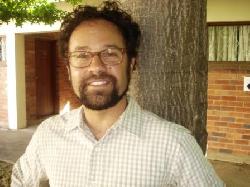
Dr Joshua Kirshner of the Geography Department addressed students and lecturers yesterday as part of the 2011 Critical Studies Seminar Series hosted by the departments of Politics and International Studies and Sociology. Dr Kirshner shared insights gleaned from post-doc research carried out on the 2008 xenophobic attacks and their potential causes and effects in South Africa.
“The interesting thing about the xenophobic violence was that not all communities were swept up in it. It is sometimes assumed that these attacks were almost ubiquitous but this really wasn’t the case. Some places weren’t affected by it at all,” he said. For Dr Kirshner, who arrived in South Africa in 2009 after completing a PhD in City and Regional Planning from Cornell University, a more nuanced approach is needed to gain a greater depth of understanding of the issues that gave rise to the violence. Sometimes studying places which were not affected by a particular issue can be very telling. There has been a lot of research done on Alexandra and places where the violence occurred, but little if anything has looked at places where it could have but did not occur. This is what I find so interesting,” he said.
In his research, which was funded by Atlantic Philanthropies, Dr Kirshner chose to focus specifically on the area of Khutsong, a township on the West Rand, which he said “could have gone the same way as Alexandra but didn’t”. He said exploring why violence didn’t erupt in an area, which is home to many foreigners, which could have seen an outbreak could be as beneficial as asking why it did erupt in a particular area. “It gives us clues as to what is involved. By looking at where the xenophobic violence was absent and what was going on there you get a lot of pointers as to the issues involved. There are many implications for South African democracy and issues of social inclusion,” he said. “From a geographical point of view place is very important. That is why I was interested in studying a specific area like Khutsong which can tell us a lot about what is going on,” he added.
Dr Kirshner’s research paper, titled ‘“We are Gauteng People”: Challenging the politics of xenophobia in Khutsong’, South Africa, he highlights the main reasons given for the outbreak of the violence and suggests why they are inadequate. “The economic or material view is a dominant explanation for the violence but it can’t explain the target of the violence. If the causes were economic grievances then why didn’t the violence target affluent whites?” Dr Kirshner also said the fact that Khutsong was the site of violence during the 1990s following mobilisation against demarcation, and yet not during the May 2008 xenophobic attacks was of crucial importance to his research. “The uprising against the demarcation facilitated a level of inclusion amongst the foreigners in Khutsong and created a sense of unity. It could be that this played a role in why Khutsong didn’t experience the same levels of violence in 2008.”
In considering possible root causes of the xenophobic attacks he said the matter is a complex one, not least because xenophobia is “fairly entrenched in South African society. It’s complex because it seems that there is a trigger that switches existing opinions into violence. It’s not that Khutsong was so different to other places where xenophobic violence broke out. I believe it has got something to do with human nature and what is possible when people can drum up differences,” he said.
Dr Kirshner is a lecturer in the Geography Department at Rhodes University. His current
research focuses on migration, regional development and extractive industries in South Africa and Mozambique.
